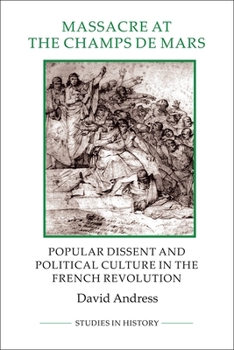Massacre at the Champ de Mars: Popular Dissent and Political Culture in the French Revolution
On 17 July 1791 the revolutionary National Guard of Paris opened fire on a crowd of protesters, citizens who saw themselves as patriots, trying to save France from a traitor king. To the National Guard and their political superiors, however, the protesters were the dregs of the people, brigands paid by counter-revolutionary aristocrats. Politicians and journalists rallied to an account of this event in which the National Guard were the patriots, and their action a heroic defence of the fledgling Constitution. Under the Jacobin Republic of 1793, however, this 'massacre' would be regarded as a high crime, a moment of clarity in which the treasonous designs of a corrupt elite were exposed. But political clarity is the last attribute that emerges from a detailed study of the events of July 1791 and their antecedents. Paris in early 1791 was feverish with political involvement. Ordinary people expressed violent opinions on the street corners, journalists published wild rumours one day and denounced scaremongering the next, political clubs grew like mushrooms and advocated the most radical solutions to political deadlock and crisis. In such an atmosphere, what did it mean to be 'one of the people'? Where were boundaries to be drawn around the national community? How could one identify threatening outsiders? What should be done about them? This book explores how Parisians of all classes sought to answer such questions, and why it was that the answers they found drove 'patriots' to confront each other on the Champ de Mars.
Format:Paperback
Language:English
ISBN:1843838427
ISBN13:9781843838425
Release Date:July 2013
Publisher:Boydell Press
Length:256 Pages
Weight:0.80 lbs.
Dimensions:0.5" x 6.1" x 9.2"
Related Subjects
HistoryCustomer Reviews
0 rating





